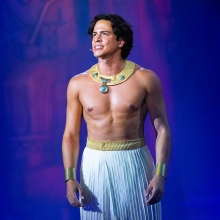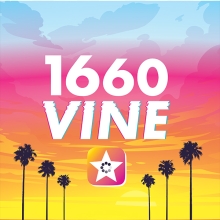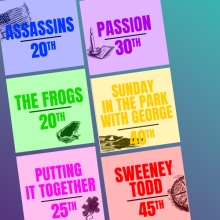
Full Synopsis
Willy Wonka introduces himself to the audience as the greatest candy maker in the world ("Pure Imagination"), explaining that he has a problem: it's time for him to retire, but who can replace him? Who will make new candy dreams come true?
Willy Wonka gathers all the Oompa-Loompas to announce his retirement and the search for the perfect "bright spark" of a child to replace him ("Golden Age of Chocolate").
Meanwhile, Charlie Bucket lives in a tiny shack with his family. They are very, very poor. Mr. Bucket asks Charlie to go out and see if anyone is done with the newspaper. As Charlie goes out, he sees children waiting outside of his house with nickels in hand for the Candy Man. The only child without a nickel is Charlie. The Candy Man comes along with Wonka treats and offers Charlie a lollipop "on the house" ("The Candy Man"). Charlie asks the Candy Man for his newspaper and brings it home. As Charlie gives the paper to his father, Mr. Bucket reads in the newspaper that Mr. Willy Wonka is having a contest! Golden Tickets have been hidden in five bars of chocolate; the lucky people who find Golden Tickets will win a tour of the factory and a lifetime supply of chocolate.
Soon, Charlie learns the enormous eater, Augustus Gloop, has found the first Golden Ticket in Munich, Germany ("I Eat More"). The reporter, Phineous Trout, announces that Veruca Salt has found the second Golden Ticket in São Paulo, Brazil. Veruca's father assisted her search by having factory workers shell chocolate wrappers.
Saddened to hear that there are only three Golden Tickets left, Charlie heads home, finding his father with news that he has just lost his job at the toothpaste factory. Charlie tells his father to remain cheerful, even though times are tough ("Think Positive").
The next day is Charlie's birthday, and he receives a Wonka bar for his present... but no Golden Ticket is found. The family tunes in the radio, only to learn Violet Beauregarde, of Snellville, Georgia, has found the third Golden Ticket. Violet is a gum chewer who switched to chocolate in order to win the contest, but is now back to constantly chewing gum. Phineous Trout interrupts to announce that Mike Teavee, in Television City, California, has found the fourth Golden Ticket. Mike and his mother explain that the only thing they need is TV, the Internet and computer games ("I See it All on TV").
Annoyed with all of the bratty children winning Golden Tickets, the Bucket family turns off the radio. As everyone goes to sleep, Charlie asks Grandpa Joe, a Willy Wonka aficionado, to tell him a Willy Wonka story. Grandpa Joe replies that he has something better: another Wonka bar! Charlie opens it, but is disappointed to find no Golden Ticket inside. Grandpa Joe and Charlie's parents – who have overheard – tell him that it's not so bad ("Cheer Up, Charlie").
The city is blanketed in a deep snow when Charlie encounters the Candy Man on the way to school. Charlie finds a coin buried in the snow and asks the Candy Man if it belongs to him. The Candy Man rewards Charlie with a Wonka bar for being "such a good kid." The starving boy wolfs it down and then immediately purchases another Wonka bar, looks at it hopefully ("Think Positive – Reprise"). Sure enough, Charlie opens the candy bar and finds the final Golden Ticket ("I've Got a Golden Ticket")! He runs home to tell his family of his win. Mrs. Bucket realizes that the tour is today and sends Charlie off to the chocolate factory with a kiss ("At the Gates").
Wonka greets the five winners at the gates. Augustus asks Wonka how many rooms are in his factory, a number that Wonka isn't entirely sure he knows ("In This Room Here"). They begin their tour of the magical factory ("Factory Reveal Sequence"). They arrive at the Chocolate Smelling Room, where Wonka chills chocolate to the perfect temperature for dipping strawberries. Augustus cannot resist tasting the chocolate and falls into a vat of it, which hardens instantly like Magic Shell, trapping Augustus. The Oompa-Loompas remove Augustus and reveal the moral of eating too much ("Oompa-Loompa 1").
For the next part of the journey, Wonka escorts his guests on a pink boat that goes through a dark and scary tunnel ("There's No Knowing"). They arrive at the Inventing Room, where Violet is tempted by the Everlasting Gourmet Gobstopper. Wonka states that it isn't perfected yet and so it should not be chewed, but Violet ignores the statement ("Chew It"). She snatches one, chews it and swells like a giant blueberry. The Oompa-Loompas remove her and explain the hazards of children who chew gum too much ("Oompa-Loompa 2").
Charlie is separated from the group and discovers the Fizzy Lifting Drink. He tastes a bit of the drink and flies up into the sky ("Flying"). He notices, however, that he is about to be sucked in by a giant fan. Before he reaches it, though, Charlie burps and floats safely to the ground ("Burping Song"). He rejoins the group in the Nut Room, where Veruca demands a squirrel, a pink candy boat and an Oompa-Loompa ("I Want it Now!"). Veruca disappears down a trash chute that leads to the garbage incinerator, which may or may not be lit. The Oompa-Loompas discuss the moral of spoiled brats ("Oompa-Loompa 3").
With just Charlie and Mike left, the tour reaches the Choco-vision Room, where Mike meets his temptation and is shrunk to barely six inches tall. The Oompa-Loompas discuss the moral of too much TV and technology ("Oompa-Loompa 4").
At the conclusion of the tour, Charlie does something remarkable: he thanks Wonka for the tour, admitting to tasting the Fizzy Lifting Drink and breaking the rules. Wonka reveals the truth: that the tour was a test of character, and only Charlie has succeeded! Wonka proclaims Charlie as his successor; the four other Golden Ticket holders enter, now all the wiser as a result of their experiences that day. Charlie reenters, dressed exactly as Wonka, groomed to take over and invent new candy ("Finale").
Show History
Inspiration
Roald Dahl's Willy Wonka utilizes material from both Roald Dahl's children's book, Charlie and the Chocolate Factory, and the 1971 movie musical adaptation, Willy Wonka & the Chocolate Factory. After getting clearance from the Dahl estate to work on the musical, Timothy Allen McDonald went to Leslie Bricusse (Stop The World – I Want To Get Off, Jekyll & Hyde, Victor/Victoria), who had worked on the music for the original film with his deceased partner, Anthony Newley. Bricusse decided to fill the show with additional new songs that had a "retro-sounding" style of the earlier music.
The stage adaptation of Willy Wonka's story took some liberties with the original material, leaning more towards faithfulness of the film than the book. Most notably, the character of Willy Wonka serves as the narrator of the story in addition to playing his typical role. There are also songs written to introduce Augustus Gloop and Mike Teavee, along with two songs dedicated to the sequence of Charlie and Grandpa Joe drinking the Fizzy Lifting drink.
Productions
Willy Wonka premiered at the Kennedy Center from November 26 to December 26, 2004, as part of its "Imagination Celebration" series. The run was extremely successful and led to a full licensing of the show, in addition to the production of several alternate versions (see "Cultural Influence" section). Willy Wonka eventually returned to its home at the Kennedy Center for a run from December 23, 2006, to January 7, 2007, followed by a national tour that ran from September 8, 2007. to May 23, 2008. Other prominent theaters that have performed Willy Wonka include the Seattle Children's Theatre and Chicago Shakespeare Theatre, the latter of which notably utilized large puppets for many characters like the Oompa Loompas.
Cultural Influence
- Demand for Willy Wonka prompted creation of several different stage versions. Willy Wonka JR. shortens the show to one-act to be performed by middle school kids, while Willy Wonka KIDS abridges the show even more to a "bite-sized," 30-minute version for even younger performers. Willy Wonka TYA adapts the rather imaginative show for more amateur productions, also shortening the material to one act and doubling several parts for a reduced cast.
Critical Reaction
"Simply Sweet... aggressively downscale, doing its best... to make a virtue of make-believe."
– The Washington Post
"A monstrous theatrical challenge... deeply connected in tone to the nostalgic memory of that 1971 movie."
– Variety
Connect
Kennedy Center Theatre website (Original)
Billing
- Adapted for the stage by
- Music and Lyrics by
Based on the book, "Charlie and the Chocolate Factory" by Roald Dahl.
Requirements
Video Warning
In accordance with the Performance License, you MUST include the following warning in all programs and in a pre-show announcement:ANY VIDEO AND/OR AUDIO RECORDING OF THIS PRODUCTION IS STRICTLY PROHIBITED.
Included Materials
| Item | Quantity Included |
|---|---|
| LIBRETTO/VOCAL BOOK | 20 |
| PIANO CONDUCTOR'S SCORE | 1 |
| PIANO VOCAL SCORE | 1 |
| STUDY GUIDE | 1 |
| TYA PERFORMANCE TRACKS | 1 |
Production Resources
| Resource |
|---|
| FULL SCORE ACT 1 |
| FULL SCORE ACT 2 |
| HOW DOES THE SHOW GO ON-10/CS |
| HOW DOES THE SHOW GO ON? |
| LOGO PACK |
| LOGO PACK DIGITAL |
| PRODUCTIONPRO-DIGITAL SCRIPT/SCORE |
| STAGE WRITE APPLICATION |
STANDARD ORCHESTRATION
| Instrumentation | Doubling |
|---|---|
| BASS | |
| CELLO | |
| DRUMS | |
| HORN | |
| KEYBOARD 1 | |
| KEYBOARD 2 | |
| REED 1 | FLUTE |
| REED 2 | ENGLISH HORN (OPT.) , OBOE |
| REED 3 | Bb CLARINET , BASS CLARINET , BASSOON |
| TROMBONE | |
| TRUMPET | |
| VIOLIN |




